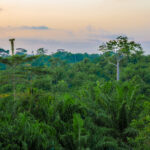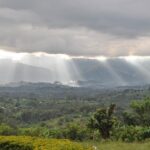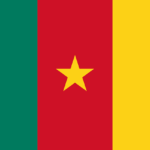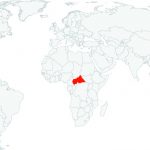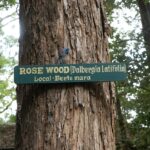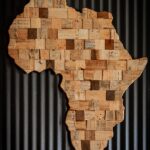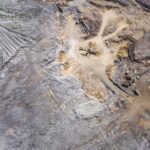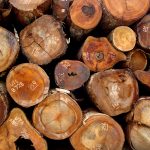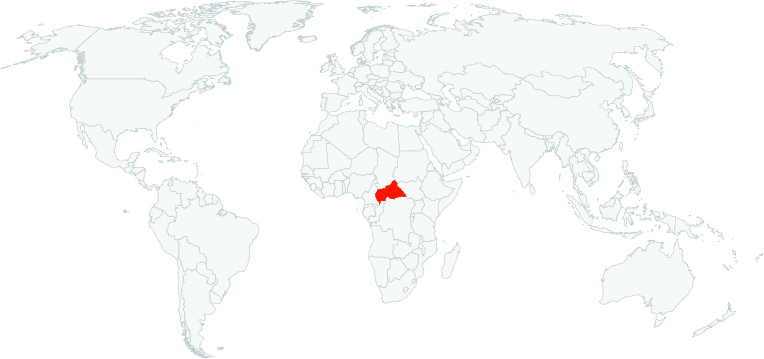
Countries in the Central African Economic and Monetary Community (CEMAC) zone continue to endure challenges from low growth, high and persistent poverty, and a strong dependence on volatile oil markets. Well-designed fiscal policies, complemented by increased timber processing, can help build a sustainable timber industry while preserving the vast natural wealth of the Congo Basin.
The World Bank report notes that due to illegal logging, a large informal logging sector, revenue losses from indiscriminate use of tax incentives, and corruption, a significant portion of potential forestry revenue is lost. As a result, revenue from forestry represented a negligible 1% of total tax revenue and 0.2% of GDP in the Congo Basin countries in 2022.
The Rainforest Foundation UK (RFUK) released a report on data it collected on human rights complaints procedures at 24 protected areas in four Congo Basin countries. The data showed that only around a third had active grievance and redress mechanisms (GRMs), and that most suffered from shortcomings related to financing, participation, design and transparency.
Of parks with procedures for community members to make complaints about human rights abuses, fewer than half kept a public register of those complaints or their outcomes.
A multinational law enforcement operation codenamed ‘Operation Jungle Shield’, coordinated by the International Initiative of Law Enforcement for Climate (I2LEC), has uncovered extensive environmental crimes across the Congo Basin. The operation hit at organized crime groups, seizing 2,111kg of ivory and 34 kg of pangolin scales, rescuing a live pangolin from trafficking, and confiscating 180 pieces of equipment used for criminal activities. 58 suspects were arrested and charged with various environmental crimes. The total value of seizures is estimated at US$11,227,857. Additionally, the operation identified illegal logging and charcoal production activities, which are estimated to have resulted in 213,227 tons of CO2 emissions.
Many of the illegal activities uncovered were found to be destined for Asian markets.
Cameroon has hiked up taxes on exported timber – with the country pushing for a total ban on log shipments from 2028. It comes as the BEAC warns that Cameroon, also the central shipping point for the Republic of the Congo and the Central African Republic, is struggling “due to poor road conditions, (and) disruptions in electricity supply,” which in turn is now hindering the industry’s long-term growth.
Last year, Wood Central reported that 4.2 million tonnes of timber products (from 2012 to 2023) were traded into Asia (instead of Europe), with the CEMAC heavily connected to China’s Belt and Road Initiative – now responsible for more than 30% of the global trade in forest products.
Timber exports to the EU from Central Africa have more than halved, falling from $US1.4 billion to $US600 million, according to the Central Africa Forest Observatory, which reports that European supply chains have turned away from Central Africa and instead are targeting South America and South East Asia for semi-finished timber products.
The 7th Edition of the World Bank’s Central African Republic Economic Update has a strong emphasis on the role that forests can play in the Central African economy as a source of livelihood for indigenous groups and as a provider of environmental services at the global level. “The Central African Republic has the opportunity to improve forest governance and develop a solid wood processing industry, while achieving the twin objectives of promoting forest conservation and ensuring a bigger stake for the forest sector in the country’s economy,” noted Guido Rurangwa, WB Country Manager for the Central African Republic.
The report outlines a range of fiscal instruments that could be used to promote sustainable forest management, i ncluding: environmental taxes, tradable permits, and biodiversity offsets. The report recommends combiningfiscal instruments with better forest governance to bolster law enforcement and strengthen surveillance and transparency. The report also calls for:
- strengthened regional cooperation through harmonized regulations, more robust law enforcement, and a better alignment of the fiscal policies on forestry in the countries of the Congo Basin; attention to be paid also to promoting enhanced institutional capacity and encouraging increased international financing. and
- guarantees of international support and greater compensation for the efforts being made by these countries.
The UN has decried illegal trade in wildlife and forest products in Nigeria with little effective prosecution. The 2023 UNODC Organized Crime Threat Assessment for Nigeria revealed that Nigeria is a key transit hub and consolidation point for various forms of illegal trade in wildlife and forest products (including rosewood). These products are sourced both from Nigeria as well as other countries in the region including Cameroon, Gabon, the Central African Republic, the Democratic Republic of Congo, Liberia, Cote d’Ivoire and Benin Republic.
Other related news cites more than 1000 records between 2011 and 2020 indicating that Nigeria is a source, transit, or destination country, or that the offender was a Nigerian national. Nigeria deals on illegal wildlife, forest products – Blueprint Newspapers Limited
In May 2023, Cameroon’s Douala Seaport came under scrutiny when a customs official stamped a shipment of timber, unveiling a complex web of illegal exports from West and Central Africa. This incident spotlighted the notorious Wagner Group’s involvement through Wood International Group, a company under US sanctions since last September. The Wagner Group’s operations in Africa, often in exchange for access to natural resources, underscore the blurred lines between legal and illicit economies.
Douala has long served as a critical juncture for illicit timber, sourced not only from Cameroon but also from neighboring countries, to be laundered through seemingly legal operations. Sawmills and warehouses proximate to Douala and Kribi ports facilitate this laundering, with China and Vietnam being the prime destinations for these exports.
Shipments of timber transported by trucks from Cameroon, the CAR and Congo-Brazzaville pass through the port hub of Douala and Kribi supply markets in China, Vietnam, France, Spain, Germany, etc. A volume of timber that could soon double thanks to the new multi-purpose quay of the wood terminal of the port of Douala inaugurated on March 29, 2023 .
According to the report “State of the forest-timber sector in Central African Republic (2021)”, between 2017 and 2021, 1,473,882 m3 of timber were exported in logs from the CAR, as compared to 78,439 m3 of sawn timber. SCAD, other Besides companies in the timber sector in the CAR, such as SOFOCAD, SEFCA and CENTRABOIS, make regular trips to the port of Douala (Littoral), as well as to the deep-water port of Kribi, in the south of Cameroon .
In addition to timber from the Central African Republic, the Port of Douala’s Timber Terminal also receives shipments from northern Congo-Brazzaville, where the forest sector generates a turnover of about 100 billion CFA francs a year and contributes 20 billion CFA francs to government tax revenues .
The tropical forests of the Congo Basin are home to nearly 1 million indigenous people. After thousands of years of survival, deforestation is perhaps their biggest challenge yet. On International Day of the World’s Indigenous Peoples, FRANCE 24 takes a closer look at what’s being done to help.
While various armed groups have continued to commit egregious human rights violations against civilians, The Sentry’s investigation found that, under the cover of a counteroffensive against anti-Touadéra armed groups, Wagner, Touadéra, and his inner circle have perpetrated widespread, systematic, and well-planned campaigns of mass killing, torture, and rape throughout the country.
In the midst of this, Wagner has shown intense interest in controlling Central African minerals, particularly gold and diamonds, targeting mining sites and using violent military campaigns to drive civilians away from mining areas. While this report focuses mainly on the links with mining operations, previous research by others links Wagner to timber operations as well.
Russian mercenaries with close ties to President Vladimir Putin and a logging contractor exposed for funding African rebels help feed a barely-regulated European timber rush in one of the world’s poorest and most fragile countries, according to a new report by Earthsight.
New evidence shows that an obscure company reportedly controlled by the Russian Wagner paramilitary group supplied timber to European consumers. The trade embroils a firm listed on London’s AIM stock exchange that was part of a national delegation at the COP26 UN climate summit in Glasgow.
Drawing from Center fro Africa Strategic Stiudies recent report, which is based on recent research and programmatic work at the Africa Center for Strategic Studies, we have analyzed three ways that illegal logging affects national security and what that means for current measures to counter it.
According to Global Forest Watch, the CAR alone lost 193,000 hectares (475,000 acres) of primary rainforest between 2001 and 2021 — more than a fifth of total forest cover.
The impact is all too evident at Mbata, where the first logging companies arrived in the early 1980’s.
The Akas had already been uprooted from the heart of the forest in the Lobaye region and installed in areas closer to roads, under a policy imposed in the 1940s by the CAR’s colonial power, France.
Commercial logging, together with illicit wood cutting by individuals, has gnawed away at what they have left.
This overview report assesses the region’s progress in developing timber traceability systems to reduce additional pressures from over-exploitation due to corruption, insufficient accountability, and illegal logging. It examples how Tanzania’s established timber traceability system may offer valuable lessons to guide Congo Basin countries in a stepwise process to overcome complex models, gain political buy-in and secure government ownership.
Officials say most member states in the Central African Economic and Monetary Community, CEMAC, have failed to honor a ban on raw timber exports that was enacted last year to conserve forests and create jobs by locally processing wood.
The six member countries of the Central African bloc agreed to ban raw timber exports starting in January 2022. The ban is aimed partially at combating climate change by protecting forests from excessive logging.
However, an online meeting of CEMAC forestry and finance ministers Thursday found that only Gabon and the Republic of Congo have suspended the timber exports to China and other Asian countries. Cameroon, the Central African Republic, Chad and Equatorial Guinea have not.
The deadline for implementing the ban was initially pushed back to January 2023 to give the CEMAC countries more time to comply. Motaze suggested the bloc push back the deadline again to 2025 so countries have more time to invest in wood processing equipment and in training workers.
In Central Africa, the ban on the export of logs will no longer take effect from 1 January 2022. The entry into force of this measure has been postponed to an unspecified date. This was the outcome of the 38th ordinary session of the Council of Ministers of the Economic Union of Central Africa (UEAC), which ended on 28 October 2022 in Yaoundé, Cameroon.
This is a retropalent for the countries of the Economic Union of Central Africa (UEAC). The entry into force of the ban on timber exports in the form of logs, which was set for 1 January 2023, has been postponed to a date yet to be determined.
A recent report by European Investigative Collaborations (EIC), a transnational investigative journalism project, claims that the Wagner Group, a Russian paramilitary group with close links to the regime of Vladimir Putin and active in the Ukraine war, is engaged in the forestry business in the Central African Republic (CAR).
The report Bois Rouge was conducted in collaboration with All Eyes on Wagner, an open-source investigative project by French NGO OpenFacto that tracks Wagner’s global influence.
Wagner, which is reputed to be run by Yevgeny Prigozhin, a Russian oligarch and close confidante of Russian President Vladimir Putin, has long been reported to offer private security services to African partners – among them the CAR, Mali, and Sudan – in return for exclusive rights to gold and diamond mining in strategic areas.
However, All Eyes on Wagner says that Wagner’s interests also extend to the forestry trade in the CAR.
An investigation reveals evidence linking the Wagner group, a group of Russian mercenaries, with a timber concession in the Central African Republic
In view of the entry into force, from January 1 2023, of the measure prohibiting the export of logs in the six CEMAC countries (Cameroon, Congo, Gabon, Chad, CAR and Equatorial Guinea), a workshop devoted to the validation of the regional guidelines for taxation and forest certification is currently being held in Libreville.
Click here to access the Global Illegal Logging and Associated Trade (ILAT) Risk assessment tool and to download the Forest Trends User Guide describing the functionality of the ILAT Risk Data Tool.
Click here to access the Cattle Data Tool.

